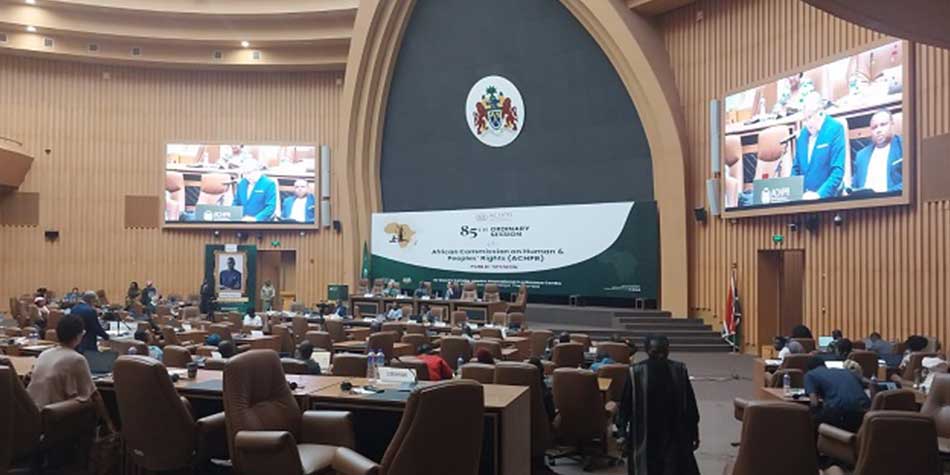
Abolition of the death penalty at the United Nations Human Rights Council 56th session
International standards
The United Nations Human Rights Council met for its 56th Regular Session from June 18 to July 12, 2024. If you missed it, here is what happened regarding the abolition of the death penalty!
During the debates
During the Global Update by the High Commissioner on Human Rights, Volker Türk called upon the government of Iran to establish for an “immediate moratorium on the death penalty, given the reported spike in executions since the beginning of the year.” The European Union made multiple statements, noting the alarming rise of executions in Iran, and condemning executions in Saudi Arbia. It denounced the provision for the death penalty within the Anti-Homosexuality Law in Uganda which is contrary to international human rights law and to Uganda’s obligations under the African Charter on Human and People’s Rights, regretted the lifting of moratorium on death penalty in the Democratic Republic of the Congo and strongly invited the Authorities to reintroduce it. Watch it here and here.
During the Presentation of the Secretary-General’s report on the situation of human rights in the Islamic Republic of Iran on June 20, Nada Al- Nashif, UN Deputy High Commissioner for Human Rights, highlighted that despite a global decline in the sentencing of children to death since 2014, Iran had executed at least two child offenders in 2023. She urged the “Government to introduce an immediate moratorium on the death penalty as a first step towards its abolition also to prohibit the execution of all offenders who were under the age of 18 at the time of the alleged crime.” She also noted the use of the death penalty against artists that were targeted for exercising their freedom of opinion and expression during protests, under the “corruption on earth” offense which carries capital punishment. Watch it here.
Civil society oral statements on the death penalty
On the occasion of this 56th session, several members of the World Coalition against the Death Penalty presented oral statements on the death penalty.
During the adoption of the Universal Periodic Review Outcome of Nigeria, the Advocates for Human Rights, Lawyers without Borders France and the World Coalition delivered a joint oral statement, denouncing that in 2023, Nigerian courts sentenced 246 people to death and as of the end of the year, at least 3413 people were on death row. They expressed their disappointment in Nigeria noting all 35 recommendations received on the death penalty with no explanation, including recommendations calling for a moratorium on executions, even though Nigeria has had a de facto moratorium since 2016. They denounced that Nigeria even noted recommendations calling to reduce the number of offenses punishable by death, as Nigerian law applies the death penalty for crimes that do not meet the threshold of most serious crimes, such as blasphemy, same-sex relations and drug-related offenses. They urged Nigerian authorities to embrace dialogue with civil society on abolition, and to ensure all 61 women on death row are held in conditions that respect the Bangkok rules. They finally urged Nigeria to abolish the mandatory death penalty for murder and consider mitigating circumstances during the sentencing of women. Watch it here.
During the adoption of the Universal Periodic Review Outcome of Jordan, the Advocates for Human Rights and the World Coalition delivered a joint statement expressing disappointment that Jordan has neither abolished the death penalty, not continued its moratorium on executions, nor respected the threshold of “most serious crimes” for offenses punishable by death. They also denounced calls from Jordan officials to retain the death penalty as a crime deterrent. They denounced the execution of Jordanian man in 2021, despite the State claiming not to have executed anyone since 2017. The highlighted that Jordan has noted all recommendations on death penalty with no explanation and urged Jordan to implement a moratorium on executions. Amnesty International also intervened and stated they were “appalled by Jordan’s rejection of the recommendations to abolish the death penalty.” Watch the statements here.
During the adoption of the Universal Periodic Review Outcome of Malaysia, Amnesty International delivered a statement and welcomed the government’s abolition of the mandatory death penalty in 2023. They however regretted that it failed to accept recommendations to take steps towards full abolition and urged the government to abolish the death penalty for all crimes, and to extend the official moratorium. Watch it here.
During the adoption of the Universal Periodic Review Outcome of Belize, the Advocates for Human Rights commended the maintaining of a moratorium on executions in Belize since 1985 and the removal of the mandatory death penalty from its criminal code. They regretted that Belize had noted 16 recommendations calling for a formal moratorium and for steps towards the abolition of the death penalty, especially as there is no one currently on death row in Belize. Watch the statement here.
During the adoption of the Universal Periodic Review Outcome of China, the International Federation for Human Rights Leagues (FIDH) delivered a statement expressing its disappointment regarding the government’s decision to note all recommendations concerning the death penalty. Watch the statement here.
During the adoption of the Universal Periodic Review Outcome of Saudi Arabia, the European Saudi Organization for Human Rights and the Advocates for Human Rights delivered a joined statement highlighting that there are stark differences between the claims of the delegation and reality. They denounced that Saudi Arabia has executed 86 people since the beginning of 2024, including for drug-related offenses and political opposition despite promises to limit the use of death penalty to the most serious crimes. The noted that the number of people on death row remains unknown due to lack of transparency and civil society allowed in the country. They highlighted that at least 2 women had been executed in 2024 despite no records of women on death row, and that at least 9 minors are currently facing death sentences despite Saudi Arabia’s claim to have removed the death penalty for minors aligned with its international obligations. Amnesty International intervened and noted that individuals continue to be sentenced to decades-long prison terms and even death for exercising their right to freedom of expression, and they documented cases of child offenders who have been sentenced to death, as well as executions for drug related crimes, despite Saudi Arabia’s claim that the death penalty was reserved for the most serious crimes. They urged the authorities to declare an official moratorium on all executions with a view to abolishing the death penalty. Watch the statements here.
During the Interactive Dialogue on oral progress report of the Special Rapporteur on Myanmar, IBAHRI delivered a statement noting that political prisoners in Myanmar face the death penalty, that at least 124 post-coup prisoners remain on death row, and urged the international community to pressure Myanmar to establish an immediate moratorium on executions. Watch it here.
Resolutions adopted
The Human Rights Council adopted 22 resolutions and 17 decisions.
Side events
One side event was organized by members of the World Coalition Against the Death Penalty.
One side event was co-organized on June 24 by the International Commission against the Death Penalty and the Permanent Mission of Belgium, and co-sponsored by the World Coalition and several member states. It was a panel discussion to commemorate the 35th Anniversary of the Second Optional Protocol to the ICCPR, aiming at the abolition of the death penalty. The event aimed at sharing good practices, concrete examples of the potential uses of the Second Optional Protocol, and pathways forward towards the abolition of the death penalty. The event included several high level speakers, including Commissioner Gloria Macapagal Arroyo, former President of the Philippines, who gave practical examples as to the use of the OP2-ICCPR to prevent the reintroduction of the death penalty in the Philippines. Cabinet Director Bernard Kouassi, Ministry of Justice and Human Rights in Côte d’Ivoire, spoke about the recent ratification of the OP2-ICCPR and the ramifications for long-lasting abolition.
The 57th regular session of the Human Rights Council is scheduled to take place in Geneva from September 9 to October 11, 2024.
Categories
Trend Towards Abolition





